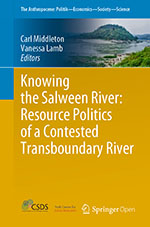APESS
Vol 27 |
Carl Middleton, Vanessa Lamb (Eds.) (Eds.): Knowing the Salween River: Resource Politics of a Contested Transboundary River (Cham: Springer International Publishing, 2019).
ISBN: 978-3-319-77439-8 (Softcover)
ISBN: 978-3-319-77440-4 (EBook)
Doi: 10.1007/978-3-319-77440-4 (add chapter no.)
Order this book on Springer Website
|

|
- Fills major knowledge gap on a major river in Southeast Asia, with empirical and conceptual contributions
- Provides a multi-disciplinary perspective by a range of writers, including academics, policy-makers and civil society researchers, the majority from within Southeast Asia
- Offers new policy insights on a river at the cross-roads of a major political and development transition
The Salween River, shared by China, Myanmar, and Thailand, is increasingly at the heart of pressing regional development debates. The basin supports the livelihoods of over 7 million people, and within it there is great socio-economic, cultural and political diversity. The basin is witnessing intensifying dynamics of resource extraction, alongside large dam construction, conservation and development intervention, that is unfolding within a complex terrain of local, national and transnational governance. With a focus on the contested politics of water and associated resources in the Salween basin, this book offers a collection of empirical case studies that highlights local knowledge and perspectives. Given the paucity of grounded social science studies in this contested basin, this book provides conceptual insights at the intersection of resource governance, development, and politics of knowledge relevant to researchers, policy-makers and practitioners at a time when rapid change is underway.
- Provides a systems perspective to building sustainable community systems at the lowest governance unit
- Gives insight on possible perspectives towards building sustainable community systems within a particular district of any country across the world
- Offers a fresh perspective to design thinking for optimizing internal design consistencies
|